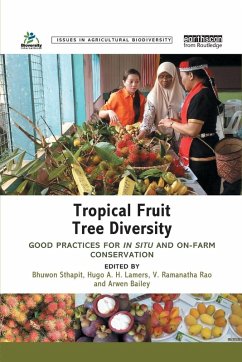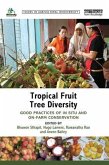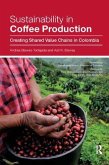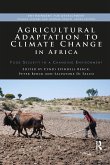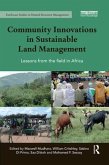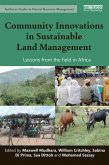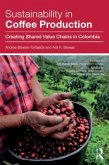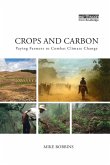Tropical Fruit Tree Diversity
Good practices for in situ and on-farm conservation
Herausgeber: Sthapit, Bhuwon; Rao, Ramanatha; Lamers, Hugo
Tropical Fruit Tree Diversity
Good practices for in situ and on-farm conservation
Herausgeber: Sthapit, Bhuwon; Rao, Ramanatha; Lamers, Hugo
- Broschiertes Buch
- Merkliste
- Auf die Merkliste
- Bewerten Bewerten
- Teilen
- Produkt teilen
- Produkterinnerung
- Produkterinnerung
Farmers have developed a range of agricultural practices to sustainably use and maintain a wide diversity of crop species in many parts of the world. This book documents good practices innovated by farmers and collects key reviews on good practices from global experts, not only from the case study countries but also from Brazil, China and other parts of Asia and Latin America. A good practice for diversity is defined as a system, organization or process that, over time and space, maintains, enhances and creates crop genetic diversity, and ensures its availability to and from farmers and other…mehr
Andere Kunden interessierten sich auch für
![Tropical Fruit Tree Diversity Tropical Fruit Tree Diversity]() Tropical Fruit Tree Diversity259,99 €
Tropical Fruit Tree Diversity259,99 €![Sustainability in Coffee Production Sustainability in Coffee Production]() Andrea Biswas-TortajadaSustainability in Coffee Production74,99 €
Andrea Biswas-TortajadaSustainability in Coffee Production74,99 €![Agricultural Adaptation to Climate Change in Africa Agricultural Adaptation to Climate Change in Africa]() Agricultural Adaptation to Climate Change in Africa67,99 €
Agricultural Adaptation to Climate Change in Africa67,99 €![Community Innovations in Sustainable Land Management Community Innovations in Sustainable Land Management]() Community Innovations in Sustainable Land Management71,99 €
Community Innovations in Sustainable Land Management71,99 €![Community Innovations in Sustainable Land Management Community Innovations in Sustainable Land Management]() Community Innovations in Sustainable Land Management227,99 €
Community Innovations in Sustainable Land Management227,99 €![Sustainability in Coffee Production Sustainability in Coffee Production]() Andrea Biswas-TortajadaSustainability in Coffee Production216,99 €
Andrea Biswas-TortajadaSustainability in Coffee Production216,99 €![Crops and Carbon Crops and Carbon]() Mike RobbinsCrops and Carbon74,99 €
Mike RobbinsCrops and Carbon74,99 €-
-
-
Farmers have developed a range of agricultural practices to sustainably use and maintain a wide diversity of crop species in many parts of the world. This book documents good practices innovated by farmers and collects key reviews on good practices from global experts, not only from the case study countries but also from Brazil, China and other parts of Asia and Latin America. A good practice for diversity is defined as a system, organization or process that, over time and space, maintains, enhances and creates crop genetic diversity, and ensures its availability to and from farmers and other users. Drawing on experiences from a UNEP-GEF project on "Conservation and Sustainable Use of Wild and Cultivated Tropical Fruit Tree Diversity for Promoting Livelihoods, Food Security and Ecosystem Services", with case studies from India, Indonesia, Malaysia and Thailand, the authors show how methods for identifying good practices are still evolving and challenges in scaling-up remain. They identify key principles effective as a strategy for mainstreaming good practice into development efforts. Few books draw principles and lessons learned from good practices. This book fills this gap by combining good practices from the research project on tropical fruit trees with chapters from external experts to broaden its scope and relevance.
Hinweis: Dieser Artikel kann nur an eine deutsche Lieferadresse ausgeliefert werden.
Hinweis: Dieser Artikel kann nur an eine deutsche Lieferadresse ausgeliefert werden.
Produktdetails
- Produktdetails
- Verlag: Routledge
- Seitenzahl: 458
- Erscheinungstermin: 7. Februar 2019
- Englisch
- Abmessung: 234mm x 156mm x 25mm
- Gewicht: 690g
- ISBN-13: 9780367172787
- ISBN-10: 036717278X
- Artikelnr.: 55116454
- Herstellerkennzeichnung
- Libri GmbH
- Europaallee 1
- 36244 Bad Hersfeld
- gpsr@libri.de
- Verlag: Routledge
- Seitenzahl: 458
- Erscheinungstermin: 7. Februar 2019
- Englisch
- Abmessung: 234mm x 156mm x 25mm
- Gewicht: 690g
- ISBN-13: 9780367172787
- ISBN-10: 036717278X
- Artikelnr.: 55116454
- Herstellerkennzeichnung
- Libri GmbH
- Europaallee 1
- 36244 Bad Hersfeld
- gpsr@libri.de
Bhuwon Sthapit is an in situ conservation specialist at Bioversity International based in Pokhara, Nepal. Hugo A.H. Lamers is an associate scientist at Bioversity International based in New Delhi, India. V. Ramanatha Rao has worked in plant genetic resources at ICRISAT (Hyderabad, India) and at Bioversity International (Italy, Singapore and Malaysia). Arwen Bailey is Science Editor at Bioversity International based in Rome, Italy.
Part 1: Setting Context 1. On-farm and In Situ Conservation of Tropical Fruit Tree Diversity: Context and Conceptual Framework Bhuwon Sthapit
Hugo A.H. Lamers
V. Ramanatha Rao
Arwen Bailey
Percy Sajise
Paul Quek 2. Key Concepts Bhuwon Sthapit
V. Ramanatha Rao and Hugo A.H. Lamers 3. Community Biodiversity Management as an Approach for Realizing On-farm Management of Agricultural Biodiversity Bhuwon Sthapit
Hugo A.H. Lamers
V. Ramanatha Rao and Arwen Bailey 4. Custodians of Tropical Fruit Tree Diversity: Identifying and Strengthening the Roles and Rights of Custodian Farmers Bhuwon Sthapit
Hugo A.H. Lamers and V. Ramanatha Rao Part 2: Good Practices of Agricultural Biodiversity Management and Sustainable Use 5. Good Practices for Conservation and Sustainable Use of Crop Wild Relatives of Tropical Fruit Tree Diversity Danny Hunter and Suchitra Changtragoon 6. Exotic and Indigenous Fruit Tree Diversity On-farm and the Conservation of Tree Genetic Resources: Case Studies from Sub-Saharan Africa Katja Kehlenbeck 7. Promoting Community Management of Underutilized Tropical and Subtropical Fruit Genetic Resources in Brazil Josué Francisco da Silva Júnior
Dalva Maria da Mota
Rosa Lia Barbieri and Adriana Alercia 8. Good Practice: Using Intra-specific Crop Diversity to Manage Pests and Pathogens in China Keyu Bai
Huaxian Peng
Jie Wu
Yayun Yang
Enlai Zhang
Luyuan Dai
Chunmin Lu
Yunyue Wang
Jie Yuan
Chunlin Long
Paola De Santis
and Devra Jarvis 9. Kandyan Home Gardens: a Time-tested Good Practice from Sri Lanka for Conserving Tropical Fruit Tree Diversity D.K.N.G. Pushpakumara
H.M.S. Heenkenda
B. Marambe
R.H.G. Ranil
B.V.R. Punyawardena
J. Weerahewa
G.L.L.P. Silva
D. Hunter and J. Rizvi 10. Amazonian Fruits: How Farmers Nurture Nutritional Diversity On Farm and in the Forest Patricia Shanley
Charles R. Clement
José Edmar Urano de Carvalho
Alfredo Kingo Oyama Homma
Antonio Jose Elias Amorim de Menezes Part 3: Case Studies of the Project
"Conservation and Sustainable Use of Tropical Fruit Tree Diversity" from South and Southeast Asia Case Studies: Propagation and Nursery Management 11. A Suite of Propagation and Management Techniques for Garcinia in the Central Western Ghats Region of Karnataka
India Vasudeva R.
B.M.C. Reddy and Bhuwon Sthapit 12. A Set of Interconnected Practices which Enhances and Conserve Mango Diversity in Malihabad
India Shailendra Rajan
Hugo A.H. Lamers and Barasti Lal 13. Maintenance of Mother Blocks of Citrus Rootstocks by Farmers and Nurseries for Production of Quality Planting Materials Indra Pal Singh 14. Marcotting as Good Practice for Maintaining Diversity of Citrus Swampy Lands of South Kalimantan
Indonesia Achmad Rafieq
Muhammad Sabran
Susi Lesmayati
Winarno and Idha Widi Arsanti 15. Combination of Side Grafting Technique and Informal Germplasm Exchange System in Non-irrigated Mango Orchards in Thailand Pichit Sripinta
Supattanakit Posawang
Chatchanok Noppornphan
Songpol Somsri and Bhuwon Sthapit 16. Propagation and Pruning Techniques of Garcinia atroviridis (Asam Gelugor) in Bukit Gantang
Perak
Malaysia Zahimi Hassan
Norhayati Md Harun
Mohd Nizam Abdullah
Muhammad Shafie Md Sah
Salma Idris
Hugo A.H. Lamers and Bhuwon Sthapit Case Studies: Production and Management 17. The Role of a Traditional Festival
Chhath Puja
in the Conservation and Sustainable Use of Tropical Fruits Awtar Singh
Vishal Nath
Sanjay Kumar Singh
Bhuwon Sthapit and B.M.C. Reddy 18. Multivarietal Orchards: An Age-old Conservation Practice in Mango T.M. Gajanana
M.R. Dinesh
Sudha Mysore
Bhuwon Sthapit
Hugo A.H. Lamers
B.M.C. Reddy
V. Ramanatha Rao and V. Dakshinamoorthy 19. Integrated Home Gardens for Maintaining Diversity of Mango and Citrus
and for Family Wellbeing in East Java Kuntoro Boga Andri
Putu Bagus Daroini
Winarno
Prama Yufdy
Nono Sutrisno and Idha Widi Arsanti 20. Management of Garcinia Fusca Pierre for Sustainable Use Tawatchai Nimkingrat
Ratchanee Siriyan
Auttapon Rukkaphan
Margaret C. Yoovatana and Songpol Somsri 21. Production and Management of an Underutilized Fruit: Aroi-Aroi (Garcinia forbesii King) in Home Gardens and Orchards Wong W.W.W.
Jamaluddin Lani and Hugo A.H. Lamers Case Studies: Linking Farmers with Markets (Commercialization that Supports Diversity Maintenance and Livelihood of Poor) 22. How can Markets Contribute to the Conservation of Agricultural Biodiversity on Farms? From Theory into Practice Hugo A.H. Lamers
Froukje Kruijssen
Bhuwon R. Sthapit and V. Ramanatha Rao 23. Agrotourism in Kampung Kakeng
Serian: Development and Challenges Pearlycia Brooke
Salma Idris
Rateng Girid
Lau Cheng Yuon
Muhammad Shafie Md. Sah
Hugo A.H. Lamers 24. Conserving Tropical Fruit Tree Diversity by Using their Products and Promoting Agrotourism: Lessons from an Empowered Community in Southern Thailand Montree Issarakraisila
Margaret C. Yoovatana and Songpol Somsri 25. Value Addition of a Local Food Using Garcinia Cowa Leaves through Collective Actions and Marketing by Women's Groups Samroeng Changprasert
Sombat Tongtao
Chatchanok Noppornphan and Songpol Somsri 26. Value Creation for Garcinia Gummi-gutta and Garcinia indica through Energy-efficient Dryers and Product Differentiation in Central Western Ghats region of Karnataka
India Vasudeva R.
Narasimha Hegde
B.M C. Reddy and Bhuwon Sthapit Case Studies: Working Modality with Communities and Multi-stakeholders Partners 27. Community Forests Utilization and Informal Regulation for Tropical Fruit Tree Conservation Adhitya Marendra Kiloes
Kuntoro Boga Andri
Achmad Rafieq
Winarno
Idha Widi Arsanti and Zahirotul Hikmah Hassan 28. An Informal Network of Grafting Experts to Help Communities Conserve and Use Wild Pickle Mango (Mangifera indica) Diversity in the central Western Ghats Region of Karnataka
India Vasudeva R.
Narasimha Hegde
B.M.C. Reddy and Bhuwon Sthapit 29. Social Capital Building for Tropical Fruit Tree Diversity Management M.P Vasimalai
M. Palanisamy and M. Kirankumar Part 4: A Way Forward 30. Reflections on Good Practice Identification
Documentation
Piloting and Mainstreaming Challenges Bhuwon Sthapit
Hugo A.H. Lamers
and V. Ramanatha Rao
Hugo A.H. Lamers
V. Ramanatha Rao
Arwen Bailey
Percy Sajise
Paul Quek 2. Key Concepts Bhuwon Sthapit
V. Ramanatha Rao and Hugo A.H. Lamers 3. Community Biodiversity Management as an Approach for Realizing On-farm Management of Agricultural Biodiversity Bhuwon Sthapit
Hugo A.H. Lamers
V. Ramanatha Rao and Arwen Bailey 4. Custodians of Tropical Fruit Tree Diversity: Identifying and Strengthening the Roles and Rights of Custodian Farmers Bhuwon Sthapit
Hugo A.H. Lamers and V. Ramanatha Rao Part 2: Good Practices of Agricultural Biodiversity Management and Sustainable Use 5. Good Practices for Conservation and Sustainable Use of Crop Wild Relatives of Tropical Fruit Tree Diversity Danny Hunter and Suchitra Changtragoon 6. Exotic and Indigenous Fruit Tree Diversity On-farm and the Conservation of Tree Genetic Resources: Case Studies from Sub-Saharan Africa Katja Kehlenbeck 7. Promoting Community Management of Underutilized Tropical and Subtropical Fruit Genetic Resources in Brazil Josué Francisco da Silva Júnior
Dalva Maria da Mota
Rosa Lia Barbieri and Adriana Alercia 8. Good Practice: Using Intra-specific Crop Diversity to Manage Pests and Pathogens in China Keyu Bai
Huaxian Peng
Jie Wu
Yayun Yang
Enlai Zhang
Luyuan Dai
Chunmin Lu
Yunyue Wang
Jie Yuan
Chunlin Long
Paola De Santis
and Devra Jarvis 9. Kandyan Home Gardens: a Time-tested Good Practice from Sri Lanka for Conserving Tropical Fruit Tree Diversity D.K.N.G. Pushpakumara
H.M.S. Heenkenda
B. Marambe
R.H.G. Ranil
B.V.R. Punyawardena
J. Weerahewa
G.L.L.P. Silva
D. Hunter and J. Rizvi 10. Amazonian Fruits: How Farmers Nurture Nutritional Diversity On Farm and in the Forest Patricia Shanley
Charles R. Clement
José Edmar Urano de Carvalho
Alfredo Kingo Oyama Homma
Antonio Jose Elias Amorim de Menezes Part 3: Case Studies of the Project
"Conservation and Sustainable Use of Tropical Fruit Tree Diversity" from South and Southeast Asia Case Studies: Propagation and Nursery Management 11. A Suite of Propagation and Management Techniques for Garcinia in the Central Western Ghats Region of Karnataka
India Vasudeva R.
B.M.C. Reddy and Bhuwon Sthapit 12. A Set of Interconnected Practices which Enhances and Conserve Mango Diversity in Malihabad
India Shailendra Rajan
Hugo A.H. Lamers and Barasti Lal 13. Maintenance of Mother Blocks of Citrus Rootstocks by Farmers and Nurseries for Production of Quality Planting Materials Indra Pal Singh 14. Marcotting as Good Practice for Maintaining Diversity of Citrus Swampy Lands of South Kalimantan
Indonesia Achmad Rafieq
Muhammad Sabran
Susi Lesmayati
Winarno and Idha Widi Arsanti 15. Combination of Side Grafting Technique and Informal Germplasm Exchange System in Non-irrigated Mango Orchards in Thailand Pichit Sripinta
Supattanakit Posawang
Chatchanok Noppornphan
Songpol Somsri and Bhuwon Sthapit 16. Propagation and Pruning Techniques of Garcinia atroviridis (Asam Gelugor) in Bukit Gantang
Perak
Malaysia Zahimi Hassan
Norhayati Md Harun
Mohd Nizam Abdullah
Muhammad Shafie Md Sah
Salma Idris
Hugo A.H. Lamers and Bhuwon Sthapit Case Studies: Production and Management 17. The Role of a Traditional Festival
Chhath Puja
in the Conservation and Sustainable Use of Tropical Fruits Awtar Singh
Vishal Nath
Sanjay Kumar Singh
Bhuwon Sthapit and B.M.C. Reddy 18. Multivarietal Orchards: An Age-old Conservation Practice in Mango T.M. Gajanana
M.R. Dinesh
Sudha Mysore
Bhuwon Sthapit
Hugo A.H. Lamers
B.M.C. Reddy
V. Ramanatha Rao and V. Dakshinamoorthy 19. Integrated Home Gardens for Maintaining Diversity of Mango and Citrus
and for Family Wellbeing in East Java Kuntoro Boga Andri
Putu Bagus Daroini
Winarno
Prama Yufdy
Nono Sutrisno and Idha Widi Arsanti 20. Management of Garcinia Fusca Pierre for Sustainable Use Tawatchai Nimkingrat
Ratchanee Siriyan
Auttapon Rukkaphan
Margaret C. Yoovatana and Songpol Somsri 21. Production and Management of an Underutilized Fruit: Aroi-Aroi (Garcinia forbesii King) in Home Gardens and Orchards Wong W.W.W.
Jamaluddin Lani and Hugo A.H. Lamers Case Studies: Linking Farmers with Markets (Commercialization that Supports Diversity Maintenance and Livelihood of Poor) 22. How can Markets Contribute to the Conservation of Agricultural Biodiversity on Farms? From Theory into Practice Hugo A.H. Lamers
Froukje Kruijssen
Bhuwon R. Sthapit and V. Ramanatha Rao 23. Agrotourism in Kampung Kakeng
Serian: Development and Challenges Pearlycia Brooke
Salma Idris
Rateng Girid
Lau Cheng Yuon
Muhammad Shafie Md. Sah
Hugo A.H. Lamers 24. Conserving Tropical Fruit Tree Diversity by Using their Products and Promoting Agrotourism: Lessons from an Empowered Community in Southern Thailand Montree Issarakraisila
Margaret C. Yoovatana and Songpol Somsri 25. Value Addition of a Local Food Using Garcinia Cowa Leaves through Collective Actions and Marketing by Women's Groups Samroeng Changprasert
Sombat Tongtao
Chatchanok Noppornphan and Songpol Somsri 26. Value Creation for Garcinia Gummi-gutta and Garcinia indica through Energy-efficient Dryers and Product Differentiation in Central Western Ghats region of Karnataka
India Vasudeva R.
Narasimha Hegde
B.M C. Reddy and Bhuwon Sthapit Case Studies: Working Modality with Communities and Multi-stakeholders Partners 27. Community Forests Utilization and Informal Regulation for Tropical Fruit Tree Conservation Adhitya Marendra Kiloes
Kuntoro Boga Andri
Achmad Rafieq
Winarno
Idha Widi Arsanti and Zahirotul Hikmah Hassan 28. An Informal Network of Grafting Experts to Help Communities Conserve and Use Wild Pickle Mango (Mangifera indica) Diversity in the central Western Ghats Region of Karnataka
India Vasudeva R.
Narasimha Hegde
B.M.C. Reddy and Bhuwon Sthapit 29. Social Capital Building for Tropical Fruit Tree Diversity Management M.P Vasimalai
M. Palanisamy and M. Kirankumar Part 4: A Way Forward 30. Reflections on Good Practice Identification
Documentation
Piloting and Mainstreaming Challenges Bhuwon Sthapit
Hugo A.H. Lamers
and V. Ramanatha Rao
Part 1: Setting Context 1. On-farm and In Situ Conservation of Tropical Fruit Tree Diversity: Context and Conceptual Framework Bhuwon Sthapit
Hugo A.H. Lamers
V. Ramanatha Rao
Arwen Bailey
Percy Sajise
Paul Quek 2. Key Concepts Bhuwon Sthapit
V. Ramanatha Rao and Hugo A.H. Lamers 3. Community Biodiversity Management as an Approach for Realizing On-farm Management of Agricultural Biodiversity Bhuwon Sthapit
Hugo A.H. Lamers
V. Ramanatha Rao and Arwen Bailey 4. Custodians of Tropical Fruit Tree Diversity: Identifying and Strengthening the Roles and Rights of Custodian Farmers Bhuwon Sthapit
Hugo A.H. Lamers and V. Ramanatha Rao Part 2: Good Practices of Agricultural Biodiversity Management and Sustainable Use 5. Good Practices for Conservation and Sustainable Use of Crop Wild Relatives of Tropical Fruit Tree Diversity Danny Hunter and Suchitra Changtragoon 6. Exotic and Indigenous Fruit Tree Diversity On-farm and the Conservation of Tree Genetic Resources: Case Studies from Sub-Saharan Africa Katja Kehlenbeck 7. Promoting Community Management of Underutilized Tropical and Subtropical Fruit Genetic Resources in Brazil Josué Francisco da Silva Júnior
Dalva Maria da Mota
Rosa Lia Barbieri and Adriana Alercia 8. Good Practice: Using Intra-specific Crop Diversity to Manage Pests and Pathogens in China Keyu Bai
Huaxian Peng
Jie Wu
Yayun Yang
Enlai Zhang
Luyuan Dai
Chunmin Lu
Yunyue Wang
Jie Yuan
Chunlin Long
Paola De Santis
and Devra Jarvis 9. Kandyan Home Gardens: a Time-tested Good Practice from Sri Lanka for Conserving Tropical Fruit Tree Diversity D.K.N.G. Pushpakumara
H.M.S. Heenkenda
B. Marambe
R.H.G. Ranil
B.V.R. Punyawardena
J. Weerahewa
G.L.L.P. Silva
D. Hunter and J. Rizvi 10. Amazonian Fruits: How Farmers Nurture Nutritional Diversity On Farm and in the Forest Patricia Shanley
Charles R. Clement
José Edmar Urano de Carvalho
Alfredo Kingo Oyama Homma
Antonio Jose Elias Amorim de Menezes Part 3: Case Studies of the Project
"Conservation and Sustainable Use of Tropical Fruit Tree Diversity" from South and Southeast Asia Case Studies: Propagation and Nursery Management 11. A Suite of Propagation and Management Techniques for Garcinia in the Central Western Ghats Region of Karnataka
India Vasudeva R.
B.M.C. Reddy and Bhuwon Sthapit 12. A Set of Interconnected Practices which Enhances and Conserve Mango Diversity in Malihabad
India Shailendra Rajan
Hugo A.H. Lamers and Barasti Lal 13. Maintenance of Mother Blocks of Citrus Rootstocks by Farmers and Nurseries for Production of Quality Planting Materials Indra Pal Singh 14. Marcotting as Good Practice for Maintaining Diversity of Citrus Swampy Lands of South Kalimantan
Indonesia Achmad Rafieq
Muhammad Sabran
Susi Lesmayati
Winarno and Idha Widi Arsanti 15. Combination of Side Grafting Technique and Informal Germplasm Exchange System in Non-irrigated Mango Orchards in Thailand Pichit Sripinta
Supattanakit Posawang
Chatchanok Noppornphan
Songpol Somsri and Bhuwon Sthapit 16. Propagation and Pruning Techniques of Garcinia atroviridis (Asam Gelugor) in Bukit Gantang
Perak
Malaysia Zahimi Hassan
Norhayati Md Harun
Mohd Nizam Abdullah
Muhammad Shafie Md Sah
Salma Idris
Hugo A.H. Lamers and Bhuwon Sthapit Case Studies: Production and Management 17. The Role of a Traditional Festival
Chhath Puja
in the Conservation and Sustainable Use of Tropical Fruits Awtar Singh
Vishal Nath
Sanjay Kumar Singh
Bhuwon Sthapit and B.M.C. Reddy 18. Multivarietal Orchards: An Age-old Conservation Practice in Mango T.M. Gajanana
M.R. Dinesh
Sudha Mysore
Bhuwon Sthapit
Hugo A.H. Lamers
B.M.C. Reddy
V. Ramanatha Rao and V. Dakshinamoorthy 19. Integrated Home Gardens for Maintaining Diversity of Mango and Citrus
and for Family Wellbeing in East Java Kuntoro Boga Andri
Putu Bagus Daroini
Winarno
Prama Yufdy
Nono Sutrisno and Idha Widi Arsanti 20. Management of Garcinia Fusca Pierre for Sustainable Use Tawatchai Nimkingrat
Ratchanee Siriyan
Auttapon Rukkaphan
Margaret C. Yoovatana and Songpol Somsri 21. Production and Management of an Underutilized Fruit: Aroi-Aroi (Garcinia forbesii King) in Home Gardens and Orchards Wong W.W.W.
Jamaluddin Lani and Hugo A.H. Lamers Case Studies: Linking Farmers with Markets (Commercialization that Supports Diversity Maintenance and Livelihood of Poor) 22. How can Markets Contribute to the Conservation of Agricultural Biodiversity on Farms? From Theory into Practice Hugo A.H. Lamers
Froukje Kruijssen
Bhuwon R. Sthapit and V. Ramanatha Rao 23. Agrotourism in Kampung Kakeng
Serian: Development and Challenges Pearlycia Brooke
Salma Idris
Rateng Girid
Lau Cheng Yuon
Muhammad Shafie Md. Sah
Hugo A.H. Lamers 24. Conserving Tropical Fruit Tree Diversity by Using their Products and Promoting Agrotourism: Lessons from an Empowered Community in Southern Thailand Montree Issarakraisila
Margaret C. Yoovatana and Songpol Somsri 25. Value Addition of a Local Food Using Garcinia Cowa Leaves through Collective Actions and Marketing by Women's Groups Samroeng Changprasert
Sombat Tongtao
Chatchanok Noppornphan and Songpol Somsri 26. Value Creation for Garcinia Gummi-gutta and Garcinia indica through Energy-efficient Dryers and Product Differentiation in Central Western Ghats region of Karnataka
India Vasudeva R.
Narasimha Hegde
B.M C. Reddy and Bhuwon Sthapit Case Studies: Working Modality with Communities and Multi-stakeholders Partners 27. Community Forests Utilization and Informal Regulation for Tropical Fruit Tree Conservation Adhitya Marendra Kiloes
Kuntoro Boga Andri
Achmad Rafieq
Winarno
Idha Widi Arsanti and Zahirotul Hikmah Hassan 28. An Informal Network of Grafting Experts to Help Communities Conserve and Use Wild Pickle Mango (Mangifera indica) Diversity in the central Western Ghats Region of Karnataka
India Vasudeva R.
Narasimha Hegde
B.M.C. Reddy and Bhuwon Sthapit 29. Social Capital Building for Tropical Fruit Tree Diversity Management M.P Vasimalai
M. Palanisamy and M. Kirankumar Part 4: A Way Forward 30. Reflections on Good Practice Identification
Documentation
Piloting and Mainstreaming Challenges Bhuwon Sthapit
Hugo A.H. Lamers
and V. Ramanatha Rao
Hugo A.H. Lamers
V. Ramanatha Rao
Arwen Bailey
Percy Sajise
Paul Quek 2. Key Concepts Bhuwon Sthapit
V. Ramanatha Rao and Hugo A.H. Lamers 3. Community Biodiversity Management as an Approach for Realizing On-farm Management of Agricultural Biodiversity Bhuwon Sthapit
Hugo A.H. Lamers
V. Ramanatha Rao and Arwen Bailey 4. Custodians of Tropical Fruit Tree Diversity: Identifying and Strengthening the Roles and Rights of Custodian Farmers Bhuwon Sthapit
Hugo A.H. Lamers and V. Ramanatha Rao Part 2: Good Practices of Agricultural Biodiversity Management and Sustainable Use 5. Good Practices for Conservation and Sustainable Use of Crop Wild Relatives of Tropical Fruit Tree Diversity Danny Hunter and Suchitra Changtragoon 6. Exotic and Indigenous Fruit Tree Diversity On-farm and the Conservation of Tree Genetic Resources: Case Studies from Sub-Saharan Africa Katja Kehlenbeck 7. Promoting Community Management of Underutilized Tropical and Subtropical Fruit Genetic Resources in Brazil Josué Francisco da Silva Júnior
Dalva Maria da Mota
Rosa Lia Barbieri and Adriana Alercia 8. Good Practice: Using Intra-specific Crop Diversity to Manage Pests and Pathogens in China Keyu Bai
Huaxian Peng
Jie Wu
Yayun Yang
Enlai Zhang
Luyuan Dai
Chunmin Lu
Yunyue Wang
Jie Yuan
Chunlin Long
Paola De Santis
and Devra Jarvis 9. Kandyan Home Gardens: a Time-tested Good Practice from Sri Lanka for Conserving Tropical Fruit Tree Diversity D.K.N.G. Pushpakumara
H.M.S. Heenkenda
B. Marambe
R.H.G. Ranil
B.V.R. Punyawardena
J. Weerahewa
G.L.L.P. Silva
D. Hunter and J. Rizvi 10. Amazonian Fruits: How Farmers Nurture Nutritional Diversity On Farm and in the Forest Patricia Shanley
Charles R. Clement
José Edmar Urano de Carvalho
Alfredo Kingo Oyama Homma
Antonio Jose Elias Amorim de Menezes Part 3: Case Studies of the Project
"Conservation and Sustainable Use of Tropical Fruit Tree Diversity" from South and Southeast Asia Case Studies: Propagation and Nursery Management 11. A Suite of Propagation and Management Techniques for Garcinia in the Central Western Ghats Region of Karnataka
India Vasudeva R.
B.M.C. Reddy and Bhuwon Sthapit 12. A Set of Interconnected Practices which Enhances and Conserve Mango Diversity in Malihabad
India Shailendra Rajan
Hugo A.H. Lamers and Barasti Lal 13. Maintenance of Mother Blocks of Citrus Rootstocks by Farmers and Nurseries for Production of Quality Planting Materials Indra Pal Singh 14. Marcotting as Good Practice for Maintaining Diversity of Citrus Swampy Lands of South Kalimantan
Indonesia Achmad Rafieq
Muhammad Sabran
Susi Lesmayati
Winarno and Idha Widi Arsanti 15. Combination of Side Grafting Technique and Informal Germplasm Exchange System in Non-irrigated Mango Orchards in Thailand Pichit Sripinta
Supattanakit Posawang
Chatchanok Noppornphan
Songpol Somsri and Bhuwon Sthapit 16. Propagation and Pruning Techniques of Garcinia atroviridis (Asam Gelugor) in Bukit Gantang
Perak
Malaysia Zahimi Hassan
Norhayati Md Harun
Mohd Nizam Abdullah
Muhammad Shafie Md Sah
Salma Idris
Hugo A.H. Lamers and Bhuwon Sthapit Case Studies: Production and Management 17. The Role of a Traditional Festival
Chhath Puja
in the Conservation and Sustainable Use of Tropical Fruits Awtar Singh
Vishal Nath
Sanjay Kumar Singh
Bhuwon Sthapit and B.M.C. Reddy 18. Multivarietal Orchards: An Age-old Conservation Practice in Mango T.M. Gajanana
M.R. Dinesh
Sudha Mysore
Bhuwon Sthapit
Hugo A.H. Lamers
B.M.C. Reddy
V. Ramanatha Rao and V. Dakshinamoorthy 19. Integrated Home Gardens for Maintaining Diversity of Mango and Citrus
and for Family Wellbeing in East Java Kuntoro Boga Andri
Putu Bagus Daroini
Winarno
Prama Yufdy
Nono Sutrisno and Idha Widi Arsanti 20. Management of Garcinia Fusca Pierre for Sustainable Use Tawatchai Nimkingrat
Ratchanee Siriyan
Auttapon Rukkaphan
Margaret C. Yoovatana and Songpol Somsri 21. Production and Management of an Underutilized Fruit: Aroi-Aroi (Garcinia forbesii King) in Home Gardens and Orchards Wong W.W.W.
Jamaluddin Lani and Hugo A.H. Lamers Case Studies: Linking Farmers with Markets (Commercialization that Supports Diversity Maintenance and Livelihood of Poor) 22. How can Markets Contribute to the Conservation of Agricultural Biodiversity on Farms? From Theory into Practice Hugo A.H. Lamers
Froukje Kruijssen
Bhuwon R. Sthapit and V. Ramanatha Rao 23. Agrotourism in Kampung Kakeng
Serian: Development and Challenges Pearlycia Brooke
Salma Idris
Rateng Girid
Lau Cheng Yuon
Muhammad Shafie Md. Sah
Hugo A.H. Lamers 24. Conserving Tropical Fruit Tree Diversity by Using their Products and Promoting Agrotourism: Lessons from an Empowered Community in Southern Thailand Montree Issarakraisila
Margaret C. Yoovatana and Songpol Somsri 25. Value Addition of a Local Food Using Garcinia Cowa Leaves through Collective Actions and Marketing by Women's Groups Samroeng Changprasert
Sombat Tongtao
Chatchanok Noppornphan and Songpol Somsri 26. Value Creation for Garcinia Gummi-gutta and Garcinia indica through Energy-efficient Dryers and Product Differentiation in Central Western Ghats region of Karnataka
India Vasudeva R.
Narasimha Hegde
B.M C. Reddy and Bhuwon Sthapit Case Studies: Working Modality with Communities and Multi-stakeholders Partners 27. Community Forests Utilization and Informal Regulation for Tropical Fruit Tree Conservation Adhitya Marendra Kiloes
Kuntoro Boga Andri
Achmad Rafieq
Winarno
Idha Widi Arsanti and Zahirotul Hikmah Hassan 28. An Informal Network of Grafting Experts to Help Communities Conserve and Use Wild Pickle Mango (Mangifera indica) Diversity in the central Western Ghats Region of Karnataka
India Vasudeva R.
Narasimha Hegde
B.M.C. Reddy and Bhuwon Sthapit 29. Social Capital Building for Tropical Fruit Tree Diversity Management M.P Vasimalai
M. Palanisamy and M. Kirankumar Part 4: A Way Forward 30. Reflections on Good Practice Identification
Documentation
Piloting and Mainstreaming Challenges Bhuwon Sthapit
Hugo A.H. Lamers
and V. Ramanatha Rao

